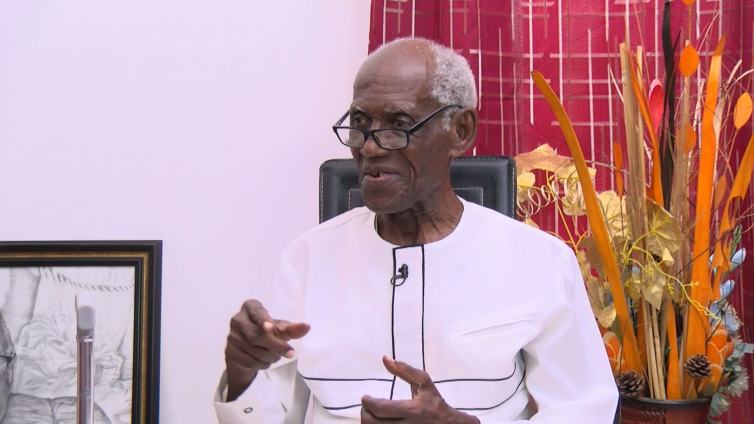It was June 2017.
In the quiet confines of a second-floor hall nestled within the Kwame Nkrumah Flats near Korle Bu, an elderly woman, her hair crowned with strands of silver, sat serenely.
"You're here," came the voice of the host when he heard our voices as we exchanged pleasantries. "You can set up, I will be with you shortly," he added.
When the door eventually swung open, a welcoming grin embodied the character whose voice had ears tucked into the radio for years.
"Meet my wife," he began, pride evident in his words. "I am 89. My wife is 91," he said.
"She's two years older than me," he chuckles.
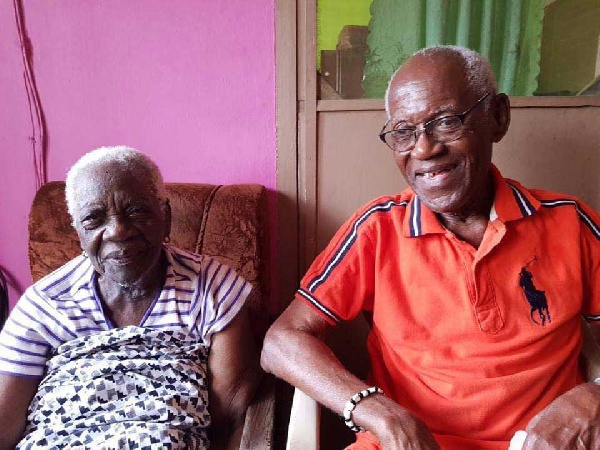
He would later share his love story, a stint in the British Navy at 16, and his "very strict," upbringing.
All these encompassed to produce a man, in the annals of Ghanaian history, amidst the fervour of sports and the grandeur of ceremonials, his name is etched in the hearts of many—a name that resonates with the essence of passion and eloquence.
Joe Lartey Sr, a titan in the realm of sports commentary, not only brought the games to life through his voice but also etched his mark on Ghana's football cultural fabric.
He defined commentary his own way and brought life to homes afar but near through his microphone.
So, When I began the journey of a documentary on how Asante Kotoko and Hearts of Oak became sworn rivals despite the geographical gap seven years ago, it would have been incomplete without the input of Mr Lartey who commentated on this game for years.
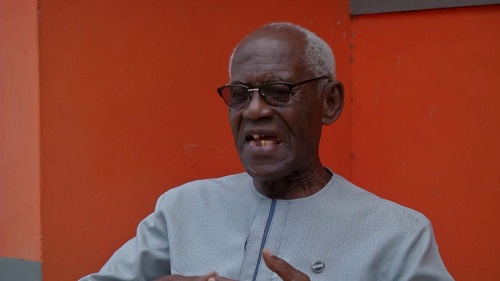
Do not ask where you can watch it.
It is a documentary that never was because the hard drive got lost and took away my soul and desire to execute it.
The cast: 1971 African Player of the Year and Kotoko legend, Ibrahim Sunday, Hearts of Oak and Asante Kotoko legend, Rev. Osei Kofi, Hearts of Oak legends, Doodo Ankrah and Albert Ankrah (a member of Hearts' famous three musketeers), veteran journalist, Ken Bediako, master of the microphone, Joe Lartey Sr, former Black Star captain, Wilberforce Mfum.
I made arrangements to speak to Kofi Badu and now late Dogo Moro, and boom...
This reminder has just torn me into pieces, but we are here for Joe Lartey, the man whose life was simple, but mighty and influenced many generations.
"My upbringing was rather strict," he recalled recently in a Prime Take interview.
"My dad as well as my mother, were very strict, so strict that I had an English friend who nicknamed my dad as 'kill Joy father' because I wasn't allowed to do many things.
'"I wasn't allowed to go to the cinema, I wasn't allowed to do sports, I wasn't allowed to practice music," he states.
"I remember one day," he began the narration of an emotionally traumatising experience with his father.
"I went to my brother-in-law's house to play organ and when I came back, my dad gave me a good hiding. I was sick for about two weeks, and you know, it made me very sad so gave up on learning to play the organ."
He did not only give up on the organ, he gave up on many things including friends he was told never to have. He gave up on being a part of the school band because he was cashiered from the group through the instruction of his father.
This life beginning for many would have crumbed them, so Joe bolted to the British Navy at 16.
"I think the strict nature of my parents was partly the reason I joined the British Navy," he says.
"At the time, the British Navy was recruiting some Ghanaians at Takoradi. So we arranged with my friends [at Accra Academy]. I was only 16. We had to falsify my age so that I could get into the Navy. By the time they knew I didn't give them the correct age, it was too late.
"I had taken the oath and therefore they couldn't get me out so I continued until the end of the second World War, the Hitler war," he recalls.
After the war, Mr Lartey and his colleagues who were discharged, demanded jobs, marched to the Castle in a peaceful demonstration, but it ended as a riot that took the life of three young Ghanaian men.
"We organised a march to the Osu Castle to tell the governor that we needed jobs," he recalls.
"We held a rally at the Palladium Cinema house near the Methodist Cathedral.
"We had met there and from there we started the march to the Castle, and when we got to the crossroads, there was this man, Emery, a white man, he was in charge of a platoon of policemen and he ordered them to stop us going to the Castle and when they didn't, he ordered them to shoot, but they refused to so he took the rifle from one of them and short Adjetey and the rest.
"It was something that you should see, not describe.
"It was scary," he says.
This was on 28th February 1948. The famous 1948 riot. Yes. That one. Joe Lartey was there.
This heart-wrenching and emotionally sapping drama, had one voice of dissent, former Nigeria President, Nnamdi Azikiwe.
"In our time," he says. "We had [Nnamdi] Azikiwe who later became the president of Nigeria.
"He was in Ghana. He was one of the people who opened the eyes of the Ghanaian youth to Independence.
"They started clamouring for this and that during his time here, so the British government in Ghana cashiered him.
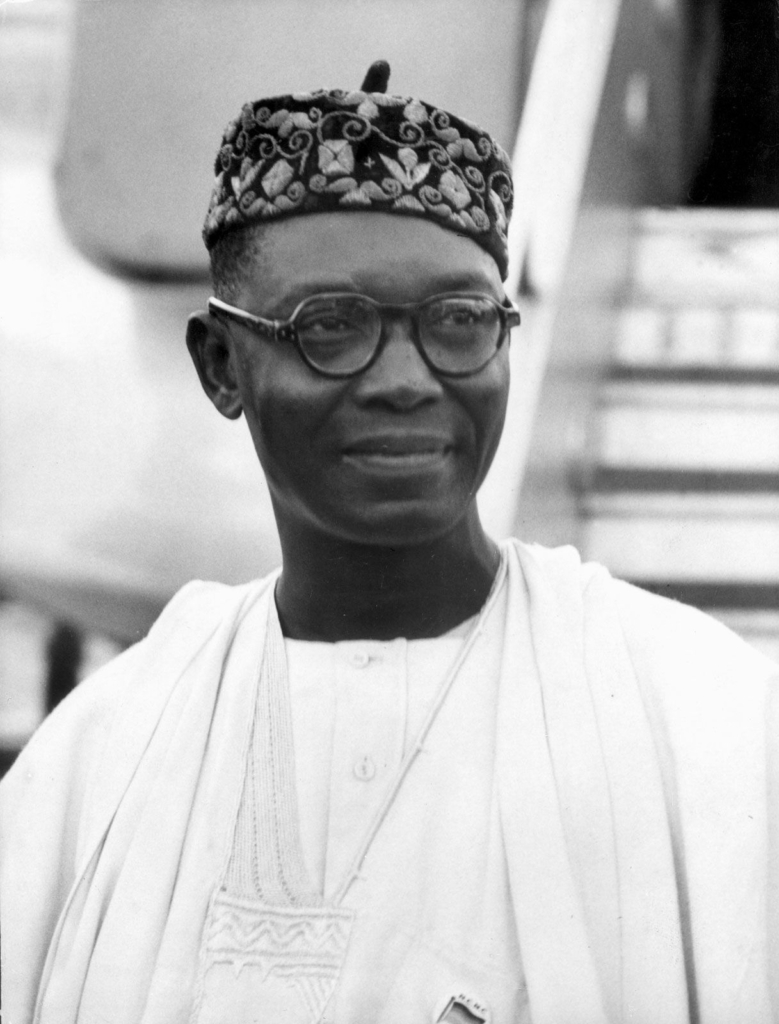
"He was in charge of one of the newspapers in Ghana; I think the Morning Post, he was editing and his editorials were stinky.
"He was bamboozling the British colonial system and they didn't like him, so I think they managed to get him out of Ghana.
"They took him to court, charged him with sedition or something and they deported him from Ghana."
Mr Azikiwe might have left Ghana, but unbeknownst to him, he built a powerful figure for unborn generations.
"After Azikiwe left Ghana, things started changing. I started having ideas about journalism. My eldest brother was one of the Apostles of Azikiwe and from that association, I learnt a lot from my eldest brother, E.A Ankrah.
Nature has an interesting way of creating a path you don't envisage.
"When I was in the Navy, we were running shifts. During our free time, we practised public speaking.
"We wrote topics on pieces of paper, folded them, and put them into a hat and when you picked a subject, then you had to speak on it.
"That was the beginning of my interest in public speaking. When I was discharged [from the Navy], there was a shop in Accra Lutterodt Street, there was a Bookshop there, that was where I bought my first public speaking book called Public Speaking and Influencing Men in Business."
The stage was set. Microphone on. Welcome to the world of journalism.
"It started like most people do. You start writing a little bit on your own and maybe writing to newspapers. I never went to the training school, the Institute of Journalism."
He didn't need to because he had built himself unknowingly through the books he read.
Another great comes to mind, Kofi Badu, current Chief of Staff of Manhyia.
"Kofi Badu had a pen that I think we haven't had again in journalism in Ghana. He was a terrific writer and if you ask me I'll say he had a poisonous pen.
"When Dr Busia became prime minister of this country, his writings were some of the factors that got Busia out.
"He could write, and his command of the English language, superb," he notes.
That's how powerful their pens were, but Joe would even be more impactful with his microphone when he eventually decided to join GBC.
"I was in journalism from 1961, professionally, that was when I joined the GBC," he recalls.
He was not hired by GBC to speak to masses, but to write and edit for readers.
"Initially," he starts the story of his journey to professional journalism, "I wasn't going to to be with the sports Department. I was sent to the Talks and Features Department and I was writing stories, and editing the stories that other people wrote from outside," he continued.
Fate intervened, and Lartey found himself thrust into the world of sports commentary, thanks to the keen eye of his mentor, Festus Addai, who later joined the Army and became a Colonel.
"Somebody took ill in the sports department under a man called Festus Addai," the story begins.
"He was in charge of a sports Department. The sports Department was known as the Outside Broadcast Department, OBs.
"The main thing they did was sports and ceremonials, so somebody fell sick in the OBs Department and was out of work and I was asked to go on relieving duties at the OBs, so I went and after the man was about returning to the department, Festus Addai refused to let me go back because he thought I was good material for the OBs department.
"There was a tug of war between him and the head of programmes, a very tough guy called Joe Ghartey, he was the head of programmes.
"Eventually, Festus won the tussle and I was asked to stay in the OBs department then I took up the commentary."
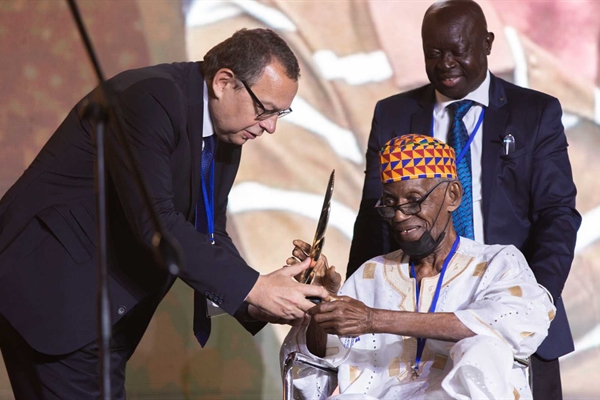
What followed was a symphony of words woven with finesse, as Lartey's voice transcended mere commentary, becoming a melody that captivated listeners and painted vivid portraits of not just sporting events.
He narrated these events with unparalleled fervour.
His partnership with Festus Addai, characterised by a seamless exchange of words and emotions, transformed broadcasts into immersive experiences, leaving an indelible mark on the memories of all who tuned in.
One of the defining moments of Lartey's career came during the historic visit of Queen Elizabeth II to Ghana—an event that stirred the nation's soul and ignited fervent debates.
From his vantage point atop a scaffold, alongside esteemed colleagues, Addai of the GBC and Godfrey Talbot of the BBC, Lartey witnessed history unfold as the Queen's arrival marked a pivotal moment in Ghana's narrative.
With his velvet voice resonating across the airwaves, Lartey captured the essence of the moment, immortalising it for generations to come.
"When the Queen arrived," he recalls. "She came in a Boeing 707. and when the plane stopped and she descended, she said, 'I am here at last.'"
"That was one of the most interesting ceremonials that we covered," he says.
Then there was the Tema Harbour Commissioning.
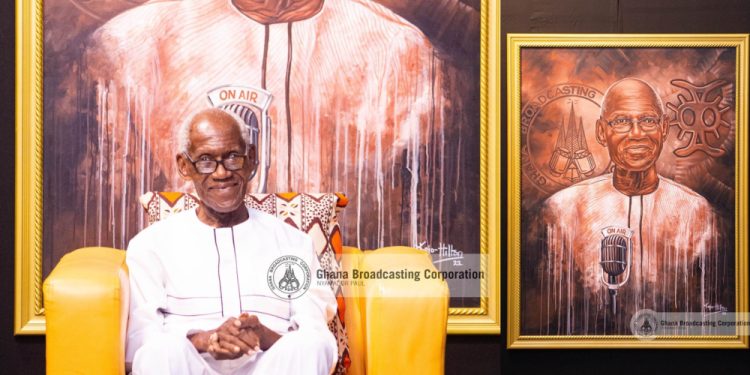
The biggest game ever, Ghana vs Real Madrid.
"Who else?" he quizzed when asked if he was in the booth for the commentary.
"I was with my boss, Festus Addai. The match took place at the Accra stadium. It was an interesting game to commentate on," he said looking back on.
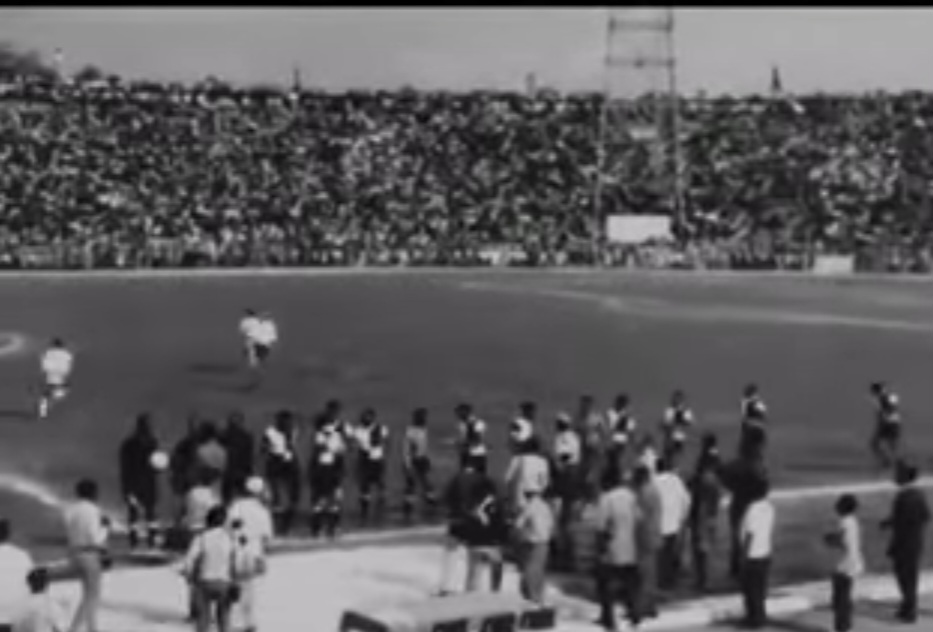
Between 1961 and 1973, Lartey commentated on many games, but one stands tall.
"I will pick Asante kotoko vs. Engelbert in Kinshasa [in 1971]. It was a match that was rarely a match. I find it difficult to forget it.
"It was a match that Mobuto [Sese Seko] the leader of DR Congo, supported wholeheartedly, the Engelbert supporters, the way they behaved, and how we the Ghanaian people weaved our way out of danger is something that weighs on my mind."
A few years on, "I left GBC out of frustration and became the Public Relations Officer of the Food Distribution Corporation."
He was among the leadership that opposed the Union Government under General Acheampong's leadership, which made him a target, prompting him to seek refuge in Nigeria for his safety.
"I was to be picked early Saturday morning, and God being so good, I got a wind of it and left the country on a Tuesday and went to Nigeria."
With his expertise, settling in the West African country was not that difficult. Nigeria's iconic commentator, Ishola Folorunsho, welcomed him with open arms.
"Nigeria broadcasting treated me very well. I should say this and say it again, they treated me very well. They have a big training school and I was given the chance to lecture at the training school which I felt was a great honour.
"When General [Muhammadu] Buhari was a military Head of State, he had a second-in-command called [Tunde] Idiagbon who was known for his discipline. He was a disciplinarian.
"He introduced a project called War Against Indiscipline (WAI) and the day it was to be launched, I was asked to go and do the commentary at the National Theatre. Everybody thought Idiagbon being a disciplinarian would be there on time, but he was about 20 minutes late.
"During my commentary, I pointed out how a disciplinarian could not keep his discipline, and so on.

"When I came back to the Nigeria broadcasting, I had a girlfriend out of that, Victoria, " he laughs. "She introduced me wherever we found ourselves."
Joe Lartey was not just about football and its narration; he served as an encyclopedia of Ghana's rich history.
His life embodied class.
Today, as we reflect on the legacy of Joe Lartey Sr, we are reminded not only of his unparalleled talent but also of the profound impact he had on the cultural landscape of Ghana.
His voice, a symphony of emotion and eloquence, continues to echo through the corridors of time, a timeless reminder of the power of storytelling and the enduring spirit of a nation united in its love for sports.
In the fabric of Ghanaian history, amidst the tumult of the ages, one name stands tall—a name whispered with reverence and spoken with admiration—the name of Joe Lartey Sr, the man who brought life to Ghana sports through his voice.
He played life for 90 minutes plus 6 minutes of added time and was on the path to 97th-minute in June, before the final whistle.
He joins his boss, Festus Addai to continue the "Over To You," at a place far away from the microphone.
They will meet in the land of the dead with their velvet voices and bring joy to those who admired their chemistry and are with them in the silent world.
Latest Stories
-
Ghana Premier League: Hearts and Kotoko will learn from Eleven Wonders in five years – CEO
1 minute -
Dr. Samuel Dotse champions Climate Action and Financial Mobilisation at 69th GEF Council Meeting in Washington, D.C. USA
8 minutes -
Day 2 of Nurses’ strike: Ridge Hospital wards deserted, patients stranded
17 minutes -
Canada-based Rektron Group to acquire major stake in Ghana’s AT Ghana
24 minutes -
Emergency services paralyzed as nurses’ strike grips Ghana’s public hospitals
25 minutes -
MUSIGA and Copyright Office pledge stronger collaboration to tackle music industry challenges
29 minutes -
June 3 disaster fuelled by politics and lawlessness – Henry Quartey asserts
29 minutes -
Moses Asaga sworn in as PURC Board Chair
37 minutes -
NDC has scammed Ghanaians with Dumsor Levy – Ntim Fordjour
37 minutes -
Radio Univers’ Dr. Sidick Ahmed set for grand farewell on June 6
38 minutes -
Diaspora property investment in Ghana: What you must know first
41 minutes -
June 3 disaster could have been avoided – Prof. Gordon
42 minutes -
Patapaa’s management issues defamation warning amid attacks
43 minutes -
NAPO confirms NIB probe into his tenure as Education Minister
47 minutes -
Re-run disputed polling stations in Ablekuma North – Omane Boamah urges EC
49 minutes

